Coffee Brewing: Why You Need Filtered Water
Key Takeaways
- Using filtered water enhances both the taste and aroma of your coffee.
- Proper mineral balance in water is crucial for ideal coffee brewing ratios.
- Various filtration options, like carbon or reverse osmosis, cater to different needs.
- Myths exist about water quality that affect coffee brewing outcomes.
- Future innovations in water filtration will continue to elevate the home coffee experience.
When brewing coffee at home, the quality of water is crucial. Using filtered water can significantly enhance the taste of your coffee, as it removes impurities like chlorine and heavy metals that can negatively affect the flavor. The minerals in filtered water also contribute to optimal extraction, ensuring that you achieve the perfect balance of flavors. Understanding and adjusting your coffee brewing ratios is equally important to reach that ideal taste profile. Whether you're crafting a robust espresso or a delicate pour-over, the foundation of great coffee begins with the purity of your water. Make sure every cup is worth savoring.
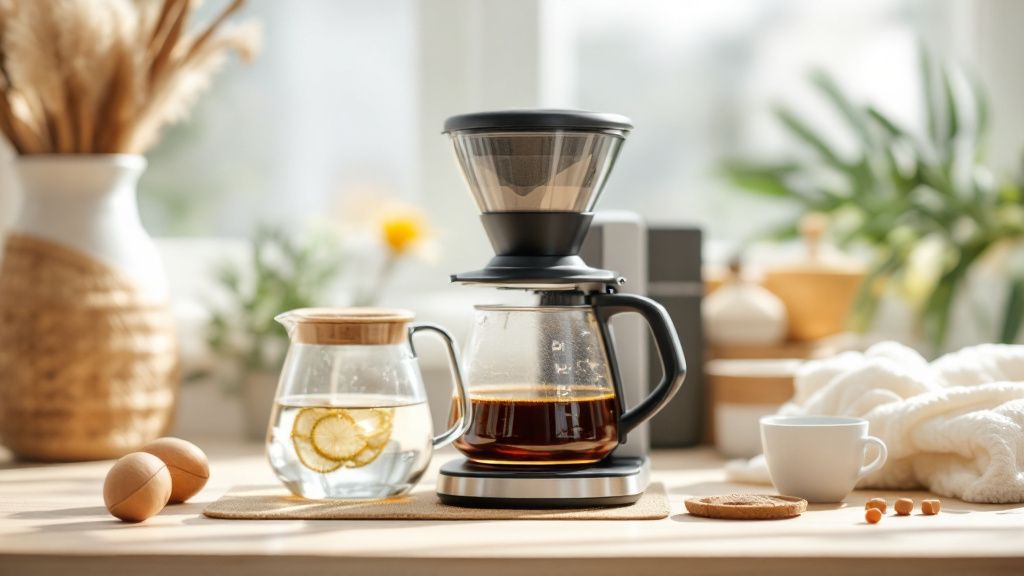
The Benefits of Using Filtered Water
Using filtered water for brewing coffee at home can unlock a richer and more flavorful experience. By eliminating contaminants such as chlorine and sediments, filtered water allows the true essence of the coffee beans to shine. This purification process helps maintain the integrity of your favorite blends, providing a clean canvas for exploring various coffee brewing ratios and techniques.
A notable advantage of using filtered water is its impact on the consistency of your daily brew. Clean water ensures that each cup mirrors the last, making it easier to perfect your brewing skills. This reliability is especially beneficial when experimenting with different methods, as the only variables left to tweak are the coffee itself and its brewing time.
Filtered water enhances not only the taste but also the aroma of your coffee. When water impurities are removed, the natural oils and fragrances of the coffee beans are preserved, resulting in a more aromatic and inviting cup. This sensory improvement adds an extra dimension to your morning ritual, elevating the overall coffee experience.
In the coming years, the use of filtered water for coffee brewing is predicted to become a standard practice for enthusiasts and casual drinkers alike. As more people discover the profound impact of quality water on their brew, the movement towards using filtered water is likely to grow, raising the bar for home coffee preparation.
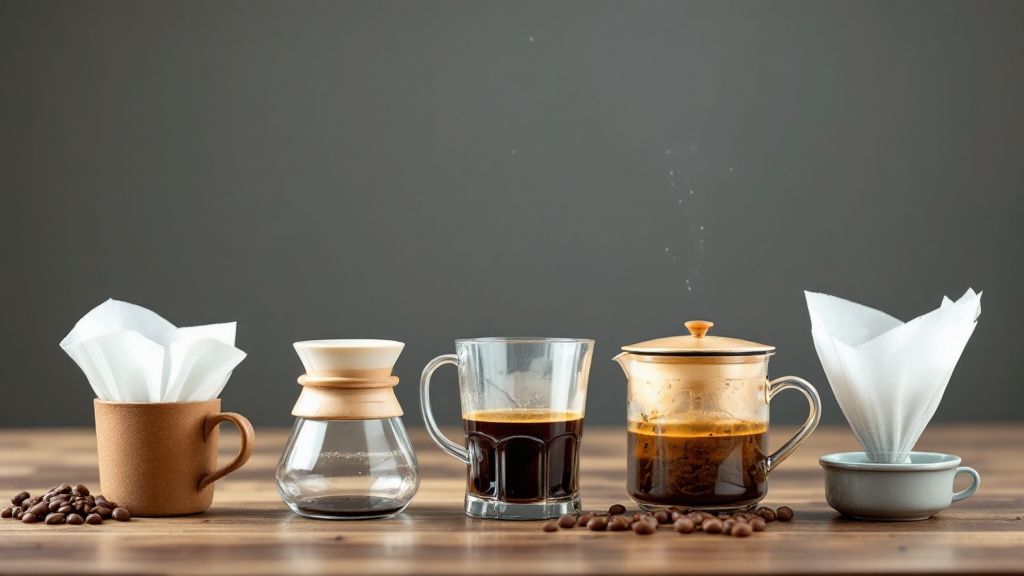
Types of Water Filters for Coffee Brewing
Choosing the right type of water filter for coffee brewing significantly influences the taste and aroma of your coffee. Carbon block filters are a popular choice, effectively removing chlorine and organic compounds to improve flavor. They work well in pitcher systems and faucet attachments, making them convenient for brewing coffee at home. Reverse osmosis systems offer another solution, using a semi-permeable membrane to remove a wide range of impurities, though they may require additional mineralization to achieve ideal coffee brewing ratios.
Tracing its evolution from the early 20th century, water filtration technology has transformed from rudimentary sand filters to advanced multi-stage systems, catering to increasingly sophisticated coffee drinkers. In-line filters are another option, commonly used in conjunction with home espresso machines. They help maintain the machine's longevity by preventing scale buildup, ensuring your equipment performs optimally over time. More recent innovations include alkaline water filters, which enhance pH levels while purifying. Each filter type has its benefits, tailor them to your unique needs.
For those seeking a more natural alternative, ceramic water filters offer a sustainable choice. These filters use tiny pores to trap bacteria and sediment, providing a cleaner water supply without removing beneficial minerals. They echo the simplicity of ancient water purification methods, yet are effective enough to make a marked difference in your coffee's taste profile. Whether you favor simplicity or sophistication, the right water filter is an essential step in creating an exceptional coffee experience.
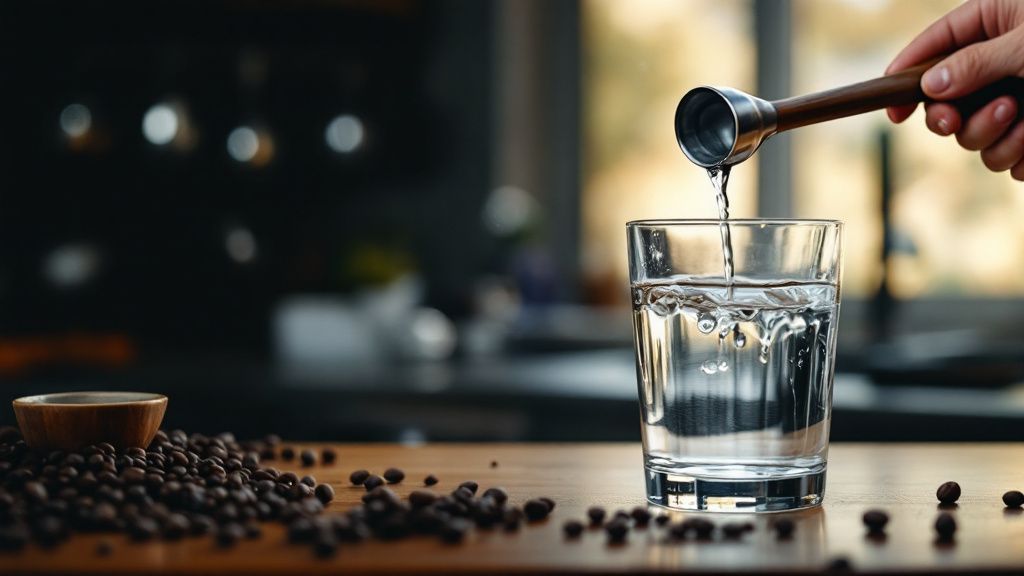
How to Choose the Right Water for Your Coffee
Understanding how to choose the right water for your coffee is key to enhancing your brewing experience. Hard water, high in minerals like calcium and magnesium, can cause scaling in coffee machines and alter the taste of your brew. Conversely, water that is too soft might lack the minerals needed for proper extraction. A balanced mineral content is crucial for achieving the optimal coffee brewing ratios, making filtered water a preferable choice for many coffee enthusiasts.
One of the challenges in brewing coffee at home is the inconsistency of water quality between regions and sources. This issue can be addressed through the use of water testing kits, which allow you to determine the hardness and pH level of your tap water. By understanding these parameters, you can choose the best filtration system to ensure your coffee's flavor profile is consistent. A blend of filtered and mineral-rich bottled water can offer a simple solution, balancing the composition for better taste and machine maintenance.
The choice of water can also impact the aromatic qualities of your coffee. Chlorine and other common water treatment chemicals often mask the subtle flavors of premium coffee beans. Selecting a filtration method that effectively removes these impurities is essential. Activated carbon filters are renowned for their ability to purge chemicals, making them a popular option for coffee lovers seeking to preserve intricate flavors. Whatever your starting point, ensuring that your water is properly treated will elevate your entire coffee ritual, turning each cup into a celebration of the beans' natural characteristics.
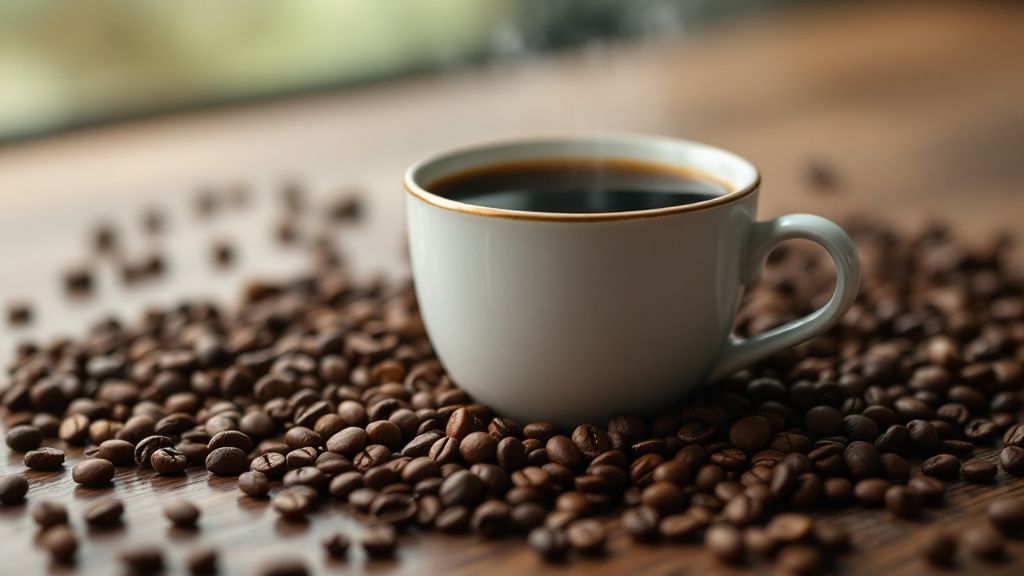
Common Myths About Water and Coffee
There are several common myths about water and its role in brewing coffee at home. One misconception is that any water will do, so long as it’s hot. However, using just any type of water, especially unfiltered water, can lead to inconsistent taste and quality. The minerals and chemicals present in untreated water can negatively impact the coffee brewing ratios, resulting in an unsatisfactory cup.
Another popular myth suggests that boiling water entirely eliminates impurities, rendering it perfect for brewing coffee. While boiling can reduce microbial content, it does little to address issues like hard water minerals or chlorine, which can still affect flavor. For coffee enthusiasts, using filtered water remains the best solution to ensure a clean and cohesive brew.
Looking ahead, the importance of water quality in coffee brewing is expected to evolve as more people become aware of its impact. Innovations in filtration technology will likely advance to meet the growing demand for high-quality brews, while educational efforts may increase, informing coffee lovers on the significance of using filtered water. This evolving understanding will shape how people approach brewing coffee at home in the future, pushing the boundaries of flavor exploration.
Frequently Asked Questions
Why is filtered water better for brewing coffee?
Filtered water removes impurities and chemical contaminants, producing a cleaner and more flavorful coffee.
Can I use any type of water filter for coffee?
Not all filters are created equal; carbon block or reverse osmosis filters are recommended for their effectiveness in removing unwanted substances while retaining essential minerals.
Does hard water affect coffee taste?
Yes, hard water can alter the taste by overwhelming the coffee’s natural flavors and causing scale buildup in coffee machines.
Is boiling water sufficient for making great coffee?
Boiling water doesn't remove chemical impurities; using filtered water ensures high-quality extraction and optimal flavor.
Are there popular myths about water and coffee?
One myth is that any hot water suffices for brewing, but water quality directly impacts the taste and consistency of coffee.
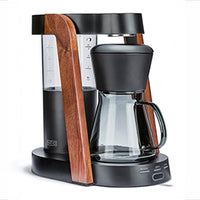 Ratio Eight S2
Ratio Eight S2
 Ratio Eight Original
Ratio Eight Original
 Ratio Six
Ratio Six
 Ratio Four
Ratio Four
 Compare Machines
Compare Machines






